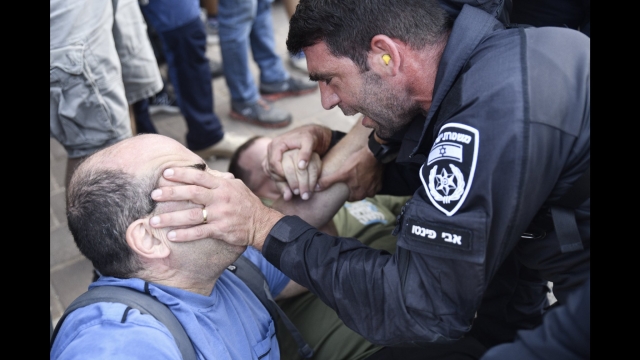Tensions soared in Modi'in the day prior to a watershed High Court session focused on evaluating the contentious "reasonableness law." Protesters, mainly representing the Brothers and Sisters in Arms reservist organization, clashed with police near the home of Justice Minister Yariv Levin. Law enforcement intervened, alleging that the crowd was positioned perilously close to the minister's residence and was disrupting public order.
Underlying Public Sentiment
To highlight their concerns, protesters brandished a sizeable banner stating, "There are judges in Jerusalem." This phrase, originally articulated by Menachem Begin, a former Prime Minister and Likud party founding member, was invoked to critique what many perceive as an attempt by the current Likud-led government to undermine Israel's judiciary.
💥Good morning from the home of Israeli Justice Minister & architect of "Judicial Reform" Yariv Levin pic.twitter.com/9OZMsQtKrZ
— Noga Tarnopolsky נגה טרנופולסקי نوغا ترنوبولسكي💙 (@NTarnopolsky) September 11, 2023
Detainment and Obstruction
Several protesters faced detainment, although official confirmation from the police remains pending. Footage disseminated via social media channels displayed attempts by protesters to obstruct Levin’s vehicle. The police were shown clearing a route for the car while simultaneously establishing a buffer zone to prevent further interaction between the crowd and the vehicle.
A Clarion Call Against the Reasonableness Law
In a formal statement, the Brothers and Sisters in Arms accused Levin of wielding an outsized influence as a "de facto prime minister." They called upon Prime Minister Benjamin Netanyahu to abandon what they termed "coup d'état laws." The group stressed that this specific law jeopardizes not only Israel’s international standing but also makes Israel Defense Forces (IDF) personnel susceptible to prosecution in the International Court of Justice in The Hague.
#WATCH: Anti-government protesters clashed with police this morning outside the home of Justice Minister Yariv Levin in Modiin.
— Israel National News - Arutz Sheva (@ArutzSheva_En) September 11, 2023
🎥 Ahim Laneshek pic.twitter.com/5zle5WjWU6
Anticipating Larger Protests and Legal Proceedings
The demonstration in Modi'in serves merely as a precursor to a more expansive protest planned for later in the day, specifically in front of the Supreme Court in Jerusalem. Thousands are projected to participate. Beyond the capital, additional, albeit smaller, protests are anticipated across the nation. The immediate context is a High Court hearing scheduled for Tuesday, where the "reasonableness law" will undergo thorough judicial scrutiny.
The Government’s Stance and Potential Crisis
Last week, Amir Ohana, the Knesset Speaker and a member of the Likud party, ignited controversy by hinting that the coalition might disregard judicial rulings. These remarks, which Netanyahu later endorsed on social media platforms, were accompanied by warnings of a potential plunge into constitutional chaos. Levin himself has previously asserted that he would reject any High Court decision invalidating his legislative efforts to overhaul the judiciary. In contrast, Defense Minister Yoav Gallant and other government officials insisted on the imperative to respect High Court decisions.
A day of demonstrations across Israel begins early outside the home of Justice Minister Yariv Levin in Modiin, ahead of the Supreme Court hearing on the government's repeal of the Reasonableness Doctrine
— Democracy Drones IL (@DemDronesIL) September 11, 2023
הפגנת בוקר מול ביתו של יריב לוין במודיעין
🎥 @barakdor#dayofprotest pic.twitter.com/ZHsoVzI42c
Legal Intricacies and Opposition Response
The "reasonableness law," representing the vanguard of the current coalition's judicial reforms, intends to limit the court’s ability to nullify cabinet or ministerial decisions deemed "extremely unreasonable." With a rare 15-justice panel set to hear the case, Israel appears to be teetering on the edge of a constitutional crisis. Opposition Leader Yair Lapid has raised concerns regarding the legislation's legitimacy as a Basic Law.
A police officer covers the mouth, nose, and eyes of a protester from ‘Brothers in Arms’ (@ahimlaneshek1) during the removal of a blockade at one of the parking entrances to Yariv Levin’s residential building in Modi’in. This method was used repeatedly in variations to cover the… https://t.co/og1EoPZkNQ
— אלימות ישראל (@Alimut_Israel) September 11, 2023
Looking Forward: The Implications
Israel is unquestionably at a critical crossroads. The pending High Court decision will likely reverberate beyond the nation's legal framework to impact its international reputation and the robustness of its democratic institutions. Given the range of public and governmental opinions, the ruling will invariably shape Israel’s legal and political landscape for years to come.


